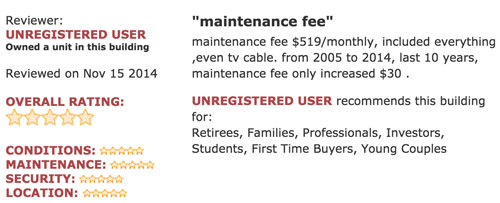
If Rob Ford couldn't freeze the City of Toronto's fees, even though he says he did, how can a condo board do it? While cutting services, Ford raised taxes.
Here is his record:
2011 0%
2012 2.5%
2013 2.0%
2014 2.7%
| • | The unit's square
footage. The bigger the unit, the higher the fees. |
| What is included in the fees? |
|
| • |
Do the fees include your unit's cost of electricity? |
| • | Do they include your unit's air
conditioning & heating costs? |
| • | Do they include your unit's water usage? |
| • | Do they include your unit's fan coil &
dryer-vent maintenance? |
| • | Do they include your unit's cable TV
package? |
| You also need to know: | |
| • | What amenities are included? |
| • | Are the Reserves fully funded? (The Reserve Funds should not include receivables) |
| • | When was the last time the
corporation had a special assessment? |
| • | Does the corporation follow the
recommended major repairs and replacements listed in the Reserve Fund Study? |
| • | What were the annual fee
increases for the previous three or four years? |
| • |
Are the windows cleaned every
year? Twice a year? |
| • |
Is the garage swept every spring? |
| • |
Are the fan coils maintained twice a year, once a year or never? |
| • |
Are the hallway carpets shampooed twice a year, yearly or are they cleaned every couple of years or so? |
| • |
Are they the same age? Older
condos may need more maintenance. |
| • | If one condo has window walls
and the other conventional windows, then window replacement and
maintenance costs will be different. |
| • | If one building is visually
cleaner, has better security and is properly maintained, then expect the fees to be higher. |
| • | What is the average annual
appreciation between the buildings and how long do the units in each
condo stay on the market before selling? |
 |
Except
in rare situations, it is impossible to run a condo without having
regular annual fee increases unless the board cuts maintenance, closes
amenities or starves the reserve funds. If Rob Ford couldn't freeze the City of Toronto's fees, even though he says he did, how can a condo board do it? While cutting services, Ford raised taxes. Here is his record: 2011 0% 2012 2.5% 2013 2.0% 2014 2.7% |
|
